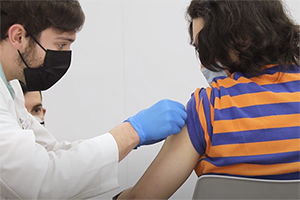COVID-19 Vaccine: Mechanism, Efficacy, and Safety

Editor's note: This article was written prior to University of the Sciences' merger with and into Saint Joseph's University and does not reflect the current, combined institution. References to programs, offices, colleges, employees, etc., may be historical information.
 USciences faculty experts are breaking down the COVID-19 vaccine, sharing more behind the science of mRNA, mechanism, efficacy and safety.
USciences faculty experts are breaking down the COVID-19 vaccine, sharing more behind the science of mRNA, mechanism, efficacy and safety.
How does the mRNA act as a vector for the delivery of the vaccine?
Nathan Baird, PhD, interim chair of the Department of Chemistry and Biochemistry, said, “The mRNA contains instructions that tell our cellular machinery how to make a portion of a viral ‘spike’ protein, which is a part of the outside packaging of the virus. Importantly, this spike protein is not infectious and is not harmful; it’s just packaging, like a box for shipping. Our immune system then learns what the viral package looks like and how to destroy it.”
Does the mRNA in the vaccine alter a person’s DNA?
Dr. Baird says, no, the vaccine does not alter the DNA of the person receiving it. “After the messenger RNA (mRNA) from the vaccine is introduced into our cells, normal cellular processes involved in protein translation ‘read the message’ and translate the mRNA into a protein. That protein is then used to ‘teach our immune system’ what the virus looks like so that our immune system will be able to destroy the virus whenever it sees it. It is important to remember that mRNA is a normal part of our cellular processes. All of our proteins are made from mRNA. The mRNA contained in this vaccine includes instructions that tell our immune cells how to make a portion of the COVID-19 viral package so that antibodies can be developed to destroy this foreign material. Our immune system then remembers how to make these antibodies and ramps up their production if the virus is later contracted naturally.”
What are the benefits of using mRNA in a vaccine versus a live virus approach?
“The use of mRNA vaccines is relatively new and presents an exciting development that may significantly alter the way many vaccines are developed in the future,” said Dr. Baird.
“In traditional vaccines, the viral genetic code, or portion thereof, is introduced into our cells. The viral genetic code is made of DNA or RNA which our cells then convert into mRNA. So, the new mRNA vaccines effectively skip one step by directly introducing mRNA into our cells. One major advantage of the mRNA vaccine is the swiftness with which it can be developed. Typical vaccines take years to develop but mRNA vaccines can be developed much faster. Additionally, mRNA vaccines have been shown to lead to very strong immunity, as we are seeing with the current COVID-19 vaccines.”
Is the COVID-19 vaccine safe and effective?
Jason Heindl, PhD, Assistant Professor in the Department of Biological Sciences, said “The short answer is yes. These vaccines are as safe as other vaccines most of us have received, and they are at least as effective.
All COVID-19 vaccines currently being administered in the US are both safe and effective. They’ve all gone through rigorous clinical trials to confirm both safety and efficacy, including independent evaluations and vetting of data by regulatory agencies. As they continue to be administered more and more data are being tracked, and the positive signals for both safety and effectiveness remain. Tens of thousands of volunteers participated in these trials and no safety concerns were uncovered. Since deployment, millions of individuals have received the vaccines and there remain no safety concerns.
Regarding effectiveness, all vaccines in use are remarkably effective at preventing serious disease, hospitalizations, and death due to COVID-19. In fact, several of the vaccines have far exceeded the desired minimum effectiveness that was targeted. They do an amazing job at protecting from disease (whether or not you feel ill). The rapid development of such safe and effective vaccines may be the true beginning of the end for the current pandemic.”
Once I’ve been vaccinated, can I go back to life as ‘normal’?
Dr. Heindl emphasizes that it is important that once vaccinated you continue with your current public health and safety practices-- including physical distancing, wearing masks, and frequent hand-washing. "Although the vaccine definitely protects you from illness, it’s possible you may still be carrying the virus and able to transmit it to others. We are hopeful that the vaccine will reduce overall viral loads (how much virus is in your body) and transmission of virus. However, studies to confirm this are ongoing. Until these studies are complete the health of our community depends on your safe practices.”
